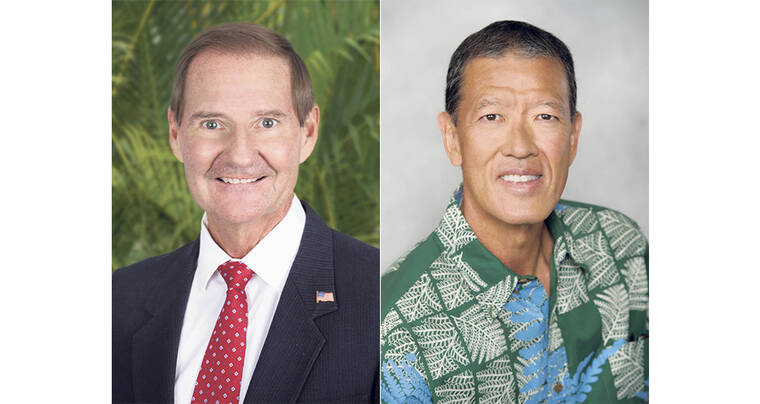A seven-year attempt by the U.S. Department of Labor to prove that the top two executives of a local architectural and design firm overvalued their company before selling it to employees has ended with a judge declaring the federal agency had presented no evidence of wrongdoing.
U.S. District Court Senior Judge Susan Oki Mollway issued findings of fact and conclusions of law Sept. 17 stating that Brian Bowers and Dexter Kubota, president and vice president of B+K Consulting, did not violate the Employee Retirement Income Security Act of 1974. The court found that no agreement with a company, URS, that indicated an interest in buying B+K Consulting at a price of $15 million was ever reached.
“This court therefore finds that the URS preliminary nonbinding indication of interest has little relevance to the actual value of the Company,” Oki Mollway wrote in her decision. “An individual who makes an offer of $15,000 for a used luxury car with a Blue Book value of $40,000 does not, by virtue of making a ‘lowball’ offer that is never accepted, tend to establish that the car is worth only $15,000. Here, there is no evidence that the URS indication of interest was the price that a willing buyer was willing to pay and that a willing seller was willing to accept.”
The government declined to pay the more than $1 million in legal fees incurred by the two executives over much of the past decade. Bowers and Kubota are challenging the government’s objection to covering their legal expenses.
In an interview with the Honolulu Star-Advertiser, the pair conveyed their deep frustration at losing 84 months of their personal and professional lives defending their reputation with clients and friends while fighting the federal government in their home state.
Bowers has lived in Hawaii for more than 40 years and Kubota was born and raised here.
“It was a distraction, both personally and professionally. When you are taking up time with something that we clearly didn’t agree with but we still have to go through the process, the legal process, and the federal government has unlimited resources to pursue a case where there clearly was no evidence … , it took seven years to get to that point. That’s a huge distraction; it’s very unfortunate,” Bowers said.
“It’s a clear victory for us, but it leaves kind of a bad taste in your mouth, because of … just what we went through.”
The DOL is continuing to evaluate available options in light of the latest ruling on the case, spokesman Jose Carnevali told the Star- Advertiser.
“We cannot provide further information or comment at this time,” Carnevali said.
Kubota said the government’s meritless accusations and the news coverage that came with the allegations damaged the firm’s reputation. He said he hopes that news of Oki Mollway’s ruling will silence questions about the company’s integrity.
According to court documents, “In December 2014, Michael Wen of the Department of Labor was told by his supervisor to ‘find some ESOP cases in Hawaii.’” (ESOP is an acronym for employee stock ownership plan in which workers are given ownership interest in a company in the form of shares of stock.)
B+K Consulting ESOP’s third-party trustee, Nicholas L. Saakvitne, was known to investigators for his work on an earlier ESOP for another company that drew the attention of the DOL, according to court documents.
David Johanson, a senior partner at the national defense litigation firm Hawkins, Parnell and Young, represented Bowers and Kubota in the case. He told the Star-Advertiser the court “wholly rejected” the Labor secretary’s allegations that the B+K Consulting ESOP overpaid for the shares of company stock that it acquired from Bowers and Kubota in December 2012. In the eight years since, the company’s stock price is up 1,200% and employees have hundreds of thousands of dollars in their accounts, he said.
Oki Mollway ruled the stock sale was conducted in a manner to ensure the ESOP did not pay greater than fair-market value for Bowers and Kubota’s shares of the company.
The court “disregarded in full” the DOL’s expert witness who alleged overpricing because his valuation was “riddled with errors,” Johanson said in a statement.
The Sept. 17 ruling confirmed that Bowers and Kubota did not inflate the projections used in the valuation process, properly monitored the institutional trustee that approved the ESOP transaction, and did not break the law, he said.
“The decision is important to confirm that the B+KC ESOP acquisition of shares of B+KC company stock was fully compliant with the law and will guide business owners in encouraging employee ownership in their succession planning efforts going forward,” Johanson said in a statement.
The federal government originally focused on Saakvitne but ultimately presented no evidence of wrongdoing against him, Johanson said. After Saakvitne’s death in 2018, the DOL scrutiny turned to the executives, according to Bowers.
Bowers said he plans to focus his frustration on recouping the money lost to seven years of defending himself against the complex civil litigation. He told employees following the ruling that the next step was to “switch from defense to offense.”
“We are fully transitioned to that now and are in the process of trying to recoup the resources that we spent over the last seven years to make our company whole,” he said.

